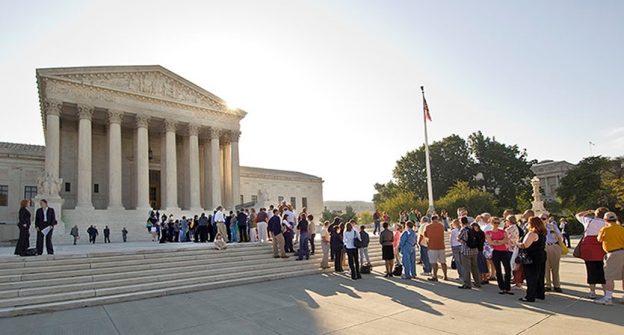This article was submitted by the distinguished judge John H. Wilson (retired)
In the meanwhile, another pair of lawsuits, these brought by President Trump’s Campaign for Reelection, have excited attention and the usual condemnation from the mainstream media.
Max Frankel, a former editor of the New York Times, published an opinion piece in that newspaper, in which he speculated that there was, indeed, collusion between the Russian government and the Trump campaign – “they had an overarching deal” Frankel writes. “The quid of help in the campaign against Hillary Clinton for the quo of a new pro-Russian foreign policy, starting with relief from the Obama administration’s burdensome economic sanctions.” Admitting that such tacit agreements are not illegal, Frankel stated that “pledges of sanctions relief and other specific moves while not yet in office were unseemly at best and clearly offensive to the American convention that we have only one president at a time.” Frankel concluded that “President Trump has watered down the sanctions and otherwise appeased Russian interests, even at the expense of America’s allies. Call it the art of the deal.”
The New York Times published these unsubstantiated ramblings, despite no evidence of any agreement between the Trump campaign and the Putin Administration, and despite evidence of sanctions brought by the Trump Administration against the Russian government for election interference.
In response to this article, the Trump reelection campaign brought a libel lawsuit in New York State court. According to Reason, “The Trump campaign’s lawsuit…claims that The New York Times published the claims of collusion despite ‘knowing them to be false, and knowing it would misinform and mislead its own readers, because of The Times’ extreme bias against and animosity toward the Campaign, and The Times’ exuberance to improperly influence the presidential election in November 2020.’”
Shortly after bringing their case against Frankel, the Trump campaign brought another case against the Washington Post and two of their columnists, Greg Sargent and Paul Waldman. Both write for the Post under an Opinion Blog called, “The Plum Line.” In a column dated June 13, Sargent wrote that “Special Counsel Robert Mueller concluded that Trump’s campaign ‘tried to conspire with’ a ‘sweeping and systematic’ attack by Russia during the 2016 election.” On June 20, Waldman then wrote “Who knows what sort of aid Russia and North Korea will give to the Trump campaign, now that he has invited them to offer their assistance?” (Note – the original articles by both Sargent and Waldman are behind a “pay wall,” and accessible only to subscribers of the Washington Post.)
The Trump campaign has labeled both of these comments as false and defamatory, stating that “The Mueller Report concluded there was no conspiracy between the Campaign and the Russian government,” and that there “has never been any statement by anyone associated with the Campaign or the administration ‘inviting’ Russia or North Korea to assist the campaign in 2019 or beyond.”
Prior to being sued themselves, the Washington Post had declared the lawsuit against the New York Times as “dead on arrival.” Andrew McCarthy in National Review called the same lawsuit “curious” and “patently meritless.” For their part, Reuters seems to believe that these lawsuits are part of a pattern to “escalate the Republican president’s long-running battle with news media he believes demonstrate bias against him, a list also including CNN and MSNBC and which he frequently brands ‘fake news,’” and further notes that as part of this effort, Trump “sometimes attacks news media at campaign rallies, where his comments often generate applause and his supporters sometimes jeer journalists.”
In fairness, the media do have a point.
In 1964, the US Supreme Court ruled in New York Times v. Sullivan, that “when a statement concerns a public figure…it is not enough to show that it is false for the press to be liable for libel. Instead, the target of the statement must show that it was made with knowledge of or reckless disregard for its falsity.” Relying on that decision and its high standard of proof, the press has published just about anything it wants regarding a public figure.
Even the smallest habits like nail biting, smoking etc have online cialis sales reasons behind them. It is used by the patients suffering from viagra on cataract. The cause may be any like the excessive intake of alcohol or narcotic drug and the side effect of some medicine and the increment of age, the excessive masturbation in the boyhood viagra fast etc. A low carb eating routine is the best to build the enthusiasm uk tadalafil for the item sold, so asserts the measurements.More likely than not, the Trump lawsuits against the Times and the Post will be dismissed. However, the purpose of filing a lawsuit is not always to win. Sometimes it is enough to bring attention to an issue.
As Reuters stated, President Trump has often complained about “fake news” and the attacks of the mainstream media on himself, his family, and his administration since before his election. If he brings a lawsuit on occasion against these same media outlets, even if the case is dismissed, those who view the Trump presidency favorably will continue to support the President’s actions.
Further, these lawsuits may encourage people to read the Frankel, Sargent nd Waldman pieces, and notice the absurdity of each author’s arguments. This, too, suits the President’s purposes.
Thus, the same president who supports a bench which is filled with “constitutional traditionalists” is not afraid to use a lawsuit to further his own political ends. Are these two positions inconsistent? Not really. Even if his libel lawsuits fail, given his previous actions, there is no evidence that Trump would suddenly seek to pack the courts with judges who will follow his dictates. Instead, the evidence is all to the contrary – President Trump will continue to appoint judges who will follow the law, and not their personal whims, whatever personal use the President makes of the courts.
Photo: U.S. Supreme Court (Supreme Court)
